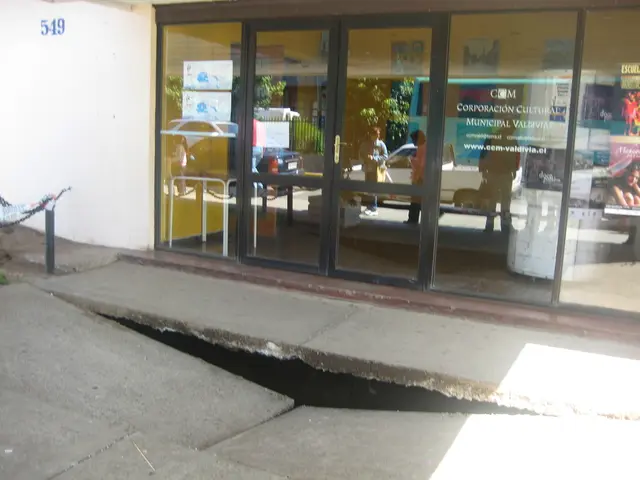Infant Passes Away in Primorye, Parents Allege Medical Negligence by Healthcare Providers
Revised Article:
Title: Alleged Negligence Rushes a Mother's Worst Fears
Over in the small village of Dunai, Primorsky Krai, Oleg Ivanov's world spun out of control when his seven-month-old baby boy fell gravely ill. Unable to eat or sleep, the boy vomited a disturbing yellow substance. With no choice but to act, Oleg and his wife rushed him to MSCH-100 in Fokino.
The clock ticked away as they waited, pediatricians nowhere to be found. They were directed instead to the emergency room where, after an agonizing two hours, a doctor finally emerged. She suspected rotavirus and dismissed them with a simple instruction: give your child water.
Back home, the baby's condition didn't improve. Determined to save their son, they called an ambulance and raced to Nakhodka City Hospital. There, they took samples, began hydration, but the boy's breathing grew more labored with each passing moment. As night fell, they waited, the crucial doctor needed for an X-ray delayed due to a surgery.
By morning, the boy's condition had worsened. His eyes rolled back, blue spots appeared on his legs, and his breathing shallowed. Frantic, Oleg recalls the ride to Fokino like a nightmare. The ambulance seemed indifferent, showing no signs of urgency until the pulse stopped. It was only then that the sirens began to roar, rushing the child to the Fokino reanimation unit.
The brave doctors battled for half an hour, but it wasn’t enough. The boy was gone. The first death certificate blamed the boy's own fluids, diagnosing him with intestinal torsion. But the more Oleg examined the situation, the more he became convinced that the medical staff had failed his son.
"They could have taken mother and son to the Nakhodka reanimation unit at 3 am instead of waiting until Vladivostok. That precious day, my son fought for his life, and no one helped him," Oleg lamented. The family has since filed a complaint against MSCH-100 staff and emergency workers from Vladivostok, alleging negligence in their child's care.
In a tragic twist, the search results show no ongoing investigation into the matter. The situation remains shrouded in mystery, the family left questioning the system that failed their son. To get answers, reaching out to local news sources or the relevant authorities and staying vigilant for updates could offer some clarity.
- The incident in Dunai, Primorsky Krai, has brought the issue of workplace-wellness and medical-conditions to the forefront, as a seven-month-old baby boy fell gravely ill with symptoms that included trouble eating, sleeping, and vomiting yellow substance.
- The baby's condition underscores the importance of healthcare institutions like MSCH-100 and Nakhodka City Hospital in addressing medical emergencies, particularly in cases of chronic diseases such as rotavirus and intestinal torsion.
- The delay in diagnosis and treatment has sparked heated discussions on health-and-wellness, with many calling for improved conditions in emergency rooms.
- The lack of immediate response from pediatricians at MSCH-100 raises questions about the system's preparedness to handle such situations, especially given the rising incidence of chronic diseases among children.
- The case also sheds light on the need for increased awareness about health-and-wellness, including nutrition and fitness-and-exercise, to boost the immune system and combat infectious diseases.
- The boy's tragic death has highlighted the importance of early detection and prompt treatment in the fight against cance and respiratory conditions.
- Eye-health, hearing, and skin-conditions are often overlooked, but they are crucial aspects of overall health that should not be neglected in such discussions.
- The case also raises concerns about mental-health, as the stress and grief endured by the parents could have lasting effects on their well-being.
- Men's health topics such as prostate and testicular cancer screenings should also be included in these discussions, as they are often underserved in healthcare systems.
- The role of nutrition and skin-care in maintaining good health throughout the aging process is another key discussion point in the wake of such incidents.
- Womens-health, including reproductive health, pregnancy, and postpartum care, is equally important and deserves equal attention in these discussions.
- Parenting resources and support systems should also be addressed to ensure the well-being of both parents and children.
- The case also raises questions about cardiovascular-health, neurological-disorders, and autoimmune-disorders, conditions that often require prompt diagnosis and treatment.
- The family's allegations of negligence have brought the issue of Medicare and its responsiveness to medical emergencies to the forefront.
- The case is a grim reminder of the need for transparency and accountability in healthcare systems, as well as the importance of therapies-and-treatments, general-news, and crime-and-justice reporting to shed light on such incidents and prevent future tragedies.








